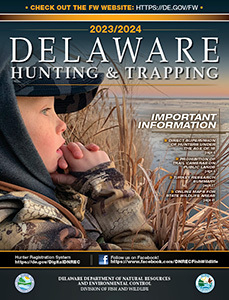Migratory Bird Hunting
Harvest Information Program – H.I.P.

If you are a Delaware migratory bird hunter (ducks, geese, swans, doves, woodcock, rails, snipe, and coots), you MUST obtain a new H.I.P number each year which are valid from July 1st through June 30th of the following year. Note: If the only migratory birds that you intend to hunt are crows, you do not need to obtain a H.I.P. number. H.I.P. is the “Harvest Information Program” which is required by the U.S. Fish and Wildlife Service (USFWS). Under the Harvest Information Program, migratory bird hunters need a special permit to hunt. A H.I.P number is specific to each state so a hunter will need a different number for each state they hunt migratory birds in. To get the permit, hunters have to provide their name and address, and answer a few questions about their previous year’s hunting effort and success. This information is collected by the state, remains totally confidential, and goes immediately to the USFWS which randomly selects hunters to receive a survey form. If you are going to hunt migratory birds in Delaware, you MUST have a H.I.P. number. To obtain your number please visit https://de.gov/DigitalDNREC or call toll free 1-855-335-4868.
This permit is free. Hunters shall record their 6-digit H.I.P. number on their hunting license. If the H.I.P. number is obtained at the same time the license is acquired, or if a hunter reprints their license after receiving their number, it will automatically be printed on the license.
non-Resident 3-Day Hunting License
- The non-resident 3-day hunting license may be used to hunt waterfowl provided the hunter has purchased the Federal Duck Stamp and state waterfowl (duck) stamp and has a H.I.P. number.
- When purchasing your waterfowl (duck) stamp on the electronic systems, the stamp image is printed on your license if you purchase your hunting license at the same time. If you purchase the stamp separately you will receive the stamp image. The Division no longer mails original waterfowl (duck) stamps automatically at the end of the season (June 30th of each year). If you would like an original stamp sent to you please answer “yes” to the question at the time of purchase or call 302-739-9918 and provide your name, address and order ID number after you purchase the electronic stamp.
Youth Waterfowl Hunting Days
Youth Waterfowl Hunts, October 21, 2023 and February 3, 2024
Open statewide on private and public lands, including state wildlife areas and the federal refuges. The lottery drawing for state blinds is 1.5 hours before legal shooting time except for the Little Creek WA where the drawing is 2 hours before legal shooting time. Hunters should arrive prior to 2 hours before legal shooting time to sign up for the lottery.
Children 10 through 15 years old may hunt, but must be under direct supervision by a licensed adult 21 years of age or older. No state or federal stamps are required. Thirteen, fourteen and fifteen year old hunters must purchase a Delaware junior hunting license. Regular season limits and waterfowl hunting regulations apply.
Adult companions must be licensed to hunt in Delaware (or exempt) but may not possess a firearm during the hunt. For more information on youth hunting, see the Youth Hunting section on Youth Hunting Information.
regulations.
Hunting From Boats
During the waterfowl season, it shall be unlawful for any person to hunt from a boat of any kind that is within 1,500 feet of an established blind, unless they have permission from the blind owner, except that:
- Any person may retrieve crippled waterfowl by the use of a boat in accordance with federal Regulations
- Any person may use a boat for transportation to and from an established blind lawfully used by such person
- Any person may hunt from a boat that is firmly secured and enclosed in an established blind.
During the waterfowl season, it shall be unlawful for any person to hunt from a boat, or a floating or fixed blind in the Little River in areas bounded on both sides by land administered by the Division.
During the waterfowl season, it shall be unlawful for any person to hunt within 900 feet of the shoreline (high tide line) of the Delaware River and Bay, between the Appoquinimink River and the Smyrna River, without written permission of the closest adjoining landowner(s). Furthermore, it shall be unlawful for any person to hunt within 1,500 feet of the shoreline (high tide line) of the Delaware River and Bay, between the Smyrna River and the Murderkill River, without written permission of the closest adjoining landowner(s).
It shall be unlawful for tender boats servicing gunning (layout) rigs to be further than 1,500 feet from the rig or to conduct any activity, except to pick up downed birds or service the rig.
Snow Geese
Hunters are reminded that Delaware and Maryland have a reciprocal agreement for hunting snow geese. Delaware hunters can hunt snow geese in Maryland with their Delaware hunting license provided they have a Maryland Migratory Game Bird Stamp, a Federal Duck Stamp, a Maryland H.I.P. number and are in compliance with Maryland Hunter Safety laws. Holders of a Delaware resident guide license should refer to the “Delaware Guide/Hunt License” section on Licensing & Permits for information related to reciprocity in other states. Maryland resident hunters can hunt snow geese in Delaware with their Maryland resident hunting license provided they obtain a Delaware License Exempt Number (LEN) specifically for hunting snow geese and they must obtain a Delaware Waterfowl (Duck) Stamp, a Federal Duck Stamp, a Delaware H.I.P. number and are in compliance with the Delaware Hunter Safety laws. When obtaining the LEN, Maryland residents will be asked to provide their Maryland DNR ID number. For more information about how to obtain a LEN see Licensing & Permits. This agreement only applies to residents of Maryland and Delaware.
Conservation Order
The snow goose Conservation Order (CO) will reopen during the winter and spring after other waterfowl hunting is closed. When the CO is open, snow goose hunters can use unplugged shotguns and electronic calls. In addition, hunting hours are extended to a half hour before sunrise to a half hour after sunset and daily bag and possession limits are removed. All hunters hunting snow geese during the Conservation Order must have a hunting license or a valid Delaware License Exempt Number (LEN) if they are exempt from purchasing a license and all licensed hunters at least 16 years of age must purchase a Delaware Waterfowl Stamp. Maryland residents that can legally hunt in Maryland and have not purchased a nonresident Delaware license or already have a Delaware LEN, are eligible to hunt in Delaware without purchasing a license provided they obtain a LEN that is specific to hunting snow geese. Unlike other license exempt hunters that are exempt from also purchasing a Delaware Waterfowl Stamp, those hunters utilizing this specific license exemption are required to purchase the stamp. All other non-resident hunters must have a Delaware non-resident hunting license or obtain a valid Delaware LEN, and all hunters at least 16 years of age must purchase a Delaware Waterfowl Stamp unless exempt from purchasing a Delaware hunting license. A federal migratory bird (duck) stamp Delaware Harvest Information Program (HIP) number are not required to participate in the Conservation Order. Holders of a Delaware resident guide license should refer to the “Delaware Guide/Hunt License” section on Licensing & Permits for information related to reciprocity in other states. All hunters hunting during the Snow Goose Conservation Order must register for a free permit number before hunting. Your registration number can be obtained by visiting https://de.gov/DigitalDNREC or by calling 1-855-DEL-HUNT (1-855-335-4868). THIS PERMIT IS FREE. The need for the Delaware Waterfowl (Duck) Stamp follows the requirements on Licensing & Permits of this guide as related to hunter age. Hunters shall record their 6-digit Snow Goose CO number on their hunting license. If the Snow Goose CO number is obtained at the same time the license is acquired, or if a hunter reprints their license after receiving their number, it will automatically be printed on the license. Hunters will also be provided a log to help them keep track of their hunting effort during the CO. When they are finished hunting, or by April 30, 2024, hunters are required to report their hunting effort by visiting https://de.gov/DigitalDNREC and logging into their profile or by calling 302-735-3600.
Tundra Swans
Tundra swans may be hunted by permit only. Hunters are only eligible for one permit annually and will be limited to one tundra swan per season. Permits will be issued through an annual random lottery. Hunters that are successfully selected during the lottery will be notified in early September. The application for the lottery may be found below and all applicants must have a valid hunting license or valid License Exempt Number by September 15, 2023. If not, their permit will be forfeited and issued to another hunter. Each permit is valid statewide but landowner permission is required to hunt on privately-owned land and hunters should refer to the information provided with their permit for rules concerning when and where tundra swan hunting is allowed on publicly-owned lands.
Up to 347 permits will be issued during the 2023/24 tundra swan hunting season through a random lottery run by the Division. The number of permits available to non-residents will be capped and shall not exceed the percentage of non-resident hunters as determined from the most recent year for which hunting license sales were certified (17.0% were non-residents). For the 2023/24 swan season, no more than 58 tundra swan permits will be given to non-residents. However, if permits remain available after all applying Delaware residents have been issued a permit, the cap may be exceeded and any additional permits will be issued to non-residents.
The Division will issue a non-reusable tag with each permit that the successful hunter must immediately affix to the bird at the time of kill. Hunters that harvest a tundra swan are no longer required to register their bird in-person to have biological data collected by a Division Biologist or Natural Resource Police Officer. Instead, hunters must report their swan harvest using the Delaware Tundra Swan Survey and return envelope included with the original mailing in which the hunter received their permit prior to the season. All hunters receiving a permit to hunt tundra swans in Delaware, must return the survey to the Division at the end of the tundra swan season to assess hunter effort and success. Hunters are required to return this survey even if they do not hunt, or hunted but did not harvest, a tundra swan. Hunters who fail to return the survey will be ineligible for future tundra swan lotteries.
Non-Toxic Shot
Non-toxic shot, as approved by the U.S. Fish and Wildlife Service, is required for all waterfowl hunting within the State of Delaware. There are no exceptions. For a list of currently approved non-toxic shot types visit http://de.gov/migbirdhuntref
Swan Identification
Tundra Swan
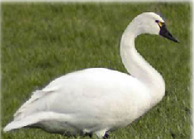
- Regulated season by permit only:
- 1 Permit/person/season
- Adult: large and entirely white with a long neck, with black wedge shaped bill showing a small yellow spot on the black facial skin in front of the eye
- Juvenile: pale dusky-brown/gray with extensive white highlights and a mostly pink bill with black tip
Mute Swan
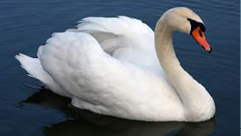
- Currently allowed to be harvested during any waterfowl season
- Unlimited take
- Non-native/exotic
- Adult: large and entirely white with a long neck, bright orange bill, black skin around face with large black knob at the base of the upper part of the bill
- Juvenile: pale dusky-brown/gray with extensive white highlights and a mostly pink bill with black base. Small black knob at the base of the upper part of the bill
Trumpeter Swan
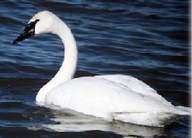
- Closed Season
- Few records in Delaware
- Adult: large and entirely white with a long neck, with black wedge shaped bill, black facial skin in front of the eye
- Juvenile: pale dusky-brown/gray with extensive white highlights and a pink center to a black bill
Shot carries beyond the lethal range. Hunters should use extreme caution when selecting the direction they shoot in.
Wood Duck Box Program
Plastic Bellrose wood duck nest boxes are available to Delaware property owners for purchase through the Division of Fish and Wildlife’s regional wildlife offices. Nest box costs are subsidized with State Waterfowl Stamp funds. Because of these subsidies, these $60 nest boxes can be purchased from the Division for just $30. Contact a Division of Fish and Wildlife regional manager to learn more!
New Castle County: 302-834-8433
Kent County: 302-284-4795
Sussex County: 302-539-3160

Delaware Waterfowl (Duck) Stamp Program
2023 Delaware Waterfowl (Duck) Stamp
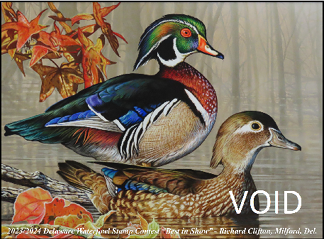
The Division of Fish and Wildlife, in partnership with Delaware Ducks Unlimited, began the waterfowl stamp and print program in 1980 to raise funds for waterfowl conservation, including acquiring and improving the wetland habitats that are vital for the survival of migratory waterfowl. These funds improve waterfowl habitat in Delaware and Canada and help to ensure that waterfowl species will prosper and provide enjoyment for generations to come.
All 2023 entries submitted had to depict a wood duck in bottomland swamp habitat typical of Delaware. The 2023 prints and stamps (as well as the 2021 and 2022 prints and stamps) will be available July 1, 2023. After June 30, 2024 the 2020 prints and stamps will be destroyed in accordance with the waterfowl stamp program policy. For information on the Delaware Waterfowl Stamp Program or to reserve and purchase prints/stamps, contact the Division at 302-739-9918 or visit our website: http://de.gov/waterfowlstamp.

